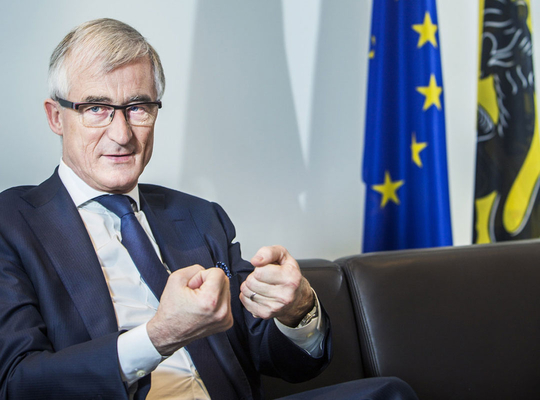You are here
Geert Bourgeois : "Macron’s European vision is a positive new sound"

I read “For European renewal” by French President Emmanuel Macron with great interest and largely with enthusiasm. It is a clear signal to the EU when one of their most important government leaders dares to critically analyse the failure of the EU to provide effective answers to the concerns of many European citizens in certain areas. ‘We cannot sleepwalk through a diminished Europe’ is a sentiment with which I agree wholeheartedly. The EU urgently needs to wake up, opt for the right priorities and pursue a results-oriented policy that better protects our citizens and businesses. The renewal of the EU as envisaged by Macron can be a new, third way, navigating between an uncritical, Europhile belief in a European superstate on the one hand and Eurosceptic forces who wish to destroy the EU and thereby threaten our peace and prosperity as well on the other.
On 23 January, following the annual summit of the World Economic Forum in Davos, I published an opinion piece on the EU titled “A strong EU must protect our citizens and businesses better”. In essence, my analysis was the same as that of Macron: the EU is not protecting our citizens and businesses adequately against the negative consequences of globalisation, for example, but that doesn’t mean we should throw the baby out with the bath water and leave the EU. Macron rightly points out the EU’s historic achievement in finally attaining lasting peace and prosperity for this continent following two bloody world wars. Moreover, and this is not easy for the president of a great and extremely proud nation, he honestly admits that no individual country (so including France) can “act on its own in the face of aggressive strategies by the major powers”. That’s also why I wrote this: “The EU on the other hand does have sufficient scale to play a meaningful role, but then it must do so with a sharp focus. The EU must protect our citizens and companies much more forcefully.” Macron wishes to renew the EU and puts forward three ambitions: freedom, protection and progress. I’m fully on board with all of them.
I also agree with many of Macron’s more specific points of focus, among other things the strengthening of European defences within a NATO framework and in cooperation with the United Kingdom, increased investment in research and innovation, improved monitoring of our external borders, a stronger Frontex and the protection of our strategic sectors against unfair competition from other parts of the world. There is indeed a particularly great deal of work to be done for an EU that truly focuses on those tasks where its scale adds value and which benefit from coordinated action.
However, there are also elements with which I do not agree and which I find worrisome. A Conference for Europe may not be a bad thing, but I am not convinced of the need for all kinds of new treaties. It is much more vital that the necessary renewal of the EU doesn’t stop at words, but also leads to concrete acts and decisions. For example, people have been talking about better monitoring of our external European borders since the 2015 asylum crisis. How much longer must we wait? And when will we finally develop that internal market further, with a transport union, an energy union and a digital union?
I am less happy with Macron’s proposals for various new agencies and councils, which threaten to further reinforce the EU’s image as bureaucratic and costly. There is already a great deal possible with the existing institutions; ideally, we can use them even more effectively. Macron is unclear on funding. With the British leaving the EU, our budgets will have to cut their coat according to their cloth. I do not agree with unlimited increases in EU budgets, paid for by national taxes and contributions, without there first being a critical analysis of what the EU’s core tasks actually are. Macron advocates, among other things, higher spending on defence, security, border protection and innovation. Agreed, but to be able to do so, the EU will have to cut costs in other areas.
Finally, I regret that Macron is so quick to lump together various movements and mindsets such as isolationism, nationalism and populism. I am no fan of isolationist sentiments either, and populism can indeed be dangerous (both the left-wing and right-wing variants, in fact), but they do act as important markers of public opinion. When such parties are winning so many votes, it is above all because the traditional parties have spoiled things for themselves, failing to take people’s fears seriously. As to nationalism: I believe that my party’s and my own inclusive nationalism differ only in detail from what Macron and the French generally prefer to call patriotisme or the love of one’s homeland. My homeland is Flanders, ideally as an independent Member State of an ever more effective EU. An EU that continues to cherish its original mission of “unity in diversity” and does not throw itself away at the altar of a European superstate.

